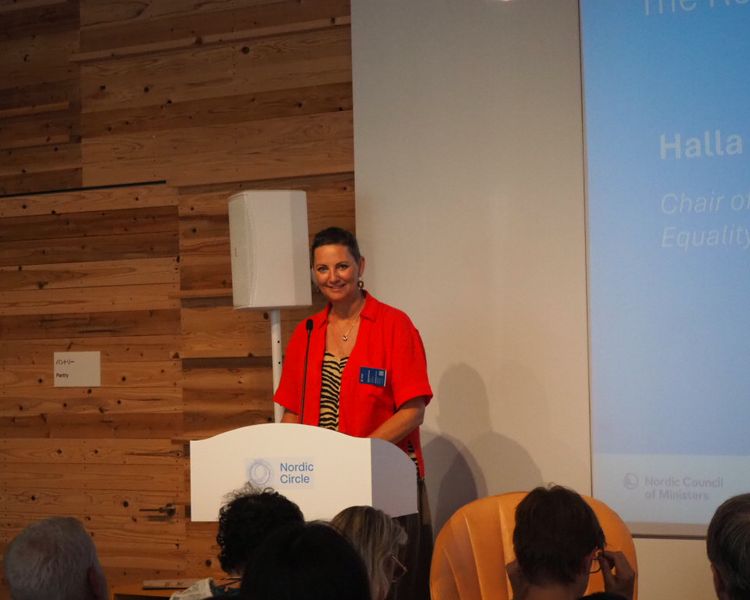Nordic Gender Equality Day: Event Report

Gender Equality Day: Event Report
On September 1, 2025, the Nordic Pavilion at Expo 2025 Osaka, Kansai hosted Gender Equality Day. The event was part of the joint “Joint Nordic Event” series organized by the five Nordic countries, bringing together policymakers, researchers, and business leaders from across the Nordic region and Japan. Discussions focused on how gender equality can contribute to sustainable growth in the context of shared challenges such as declining birthrates and aging populations.
Gender Equality as a Strategy
In her keynote speech, Ida Heimann Larsen, Deputy Secretary General of the Nordic Council of Ministers, reflected on more than 50 years of shared Nordic vision. She emphasized that “gender equality is not only a moral issue, but a strategic foundation for society and the economy.”
Larsen highlighted how shared parental leave and high-quality childcare services have enabled both women and men to take part at home and at work—fueling innovation and economic growth. She also pointed to data showing that “diversity is a source of innovation,” with gender-diverse teams proving more productive and better at solving problems.
She further stressed that there is “no single silver bullet” for achieving gender equality, but rather a need for continuous, interdisciplinary effort. At a time when many parts of the world are witnessing a push-back against equality, the Nordic countries are determined “never to go backwards, only forwards.”
The Value of Continuity in Iceland’s Example
One of the most memorable moments came from Icelandic author Yrsa Sigurðardóttir, who joined as a panelist. “We are proud to have been ranked number one in the world for gender equality for 16 consecutive years,” she said, “but what truly matters is protecting those achievements and continuing to improve.”
Her words echoed Iceland’s historical milestone: the 1975 Women’s Day Off, when 90% of Icelandic women stopped both paid and unpaid work for a day. This massive demonstration brought the country to a standstill and accelerated reforms on women’s rights and equality. It remains a powerful symbol that gender equality is not a one-time achievement, but a culture of ongoing commitment.
Highlights from the Panel Discussions
-Panel I: Stereotypes and Media
Discussion centered on how stereotypical portrayals in advertising and media shape young people’s choices and self-image. Nordic initiatives in media literacy education and regulations against biased portrayals were presented.
-Panel II: Women in Male-Dominated Fields and Leadership
Speakers from banking, industry, and policy emphasized the importance of increasing women’s participation in male-dominated sectors such as finance and technology, as well as promoting female leadership.
-Panel III: Gender Equality and Work-Life Balance
Companies such as IKEA and Sekisui House showcased policies on flexible working arrangements and inclusive workplace cultures, demonstrating how gender equality contributes to talent retention and corporate competitiveness.
Linking Happiness and Innovation
Across discussions, two messages stood out: “a sense of self-determination is a key driver of happiness” and “diversity fuels innovation.” The Nordic experience offered concrete lessons for Japan as it grapples with demographic and social challenges.
Shared Challenges, Shared Future
In closing, H.E. Jarl Frijs-Madsen, Ambassador of Denmark to Japan, underlined that “Japan and the Nordic countries face common challenges. Gender equality strengthens society and underpins both sustainability and economic growth.”
Gender Equality Day became a forum for connecting Nordic experience with Japan’s current context. The overarching message was clear: protecting past achievements, harnessing the power of diversity, and recognizing gender equality as a foundation for happiness and innovation.